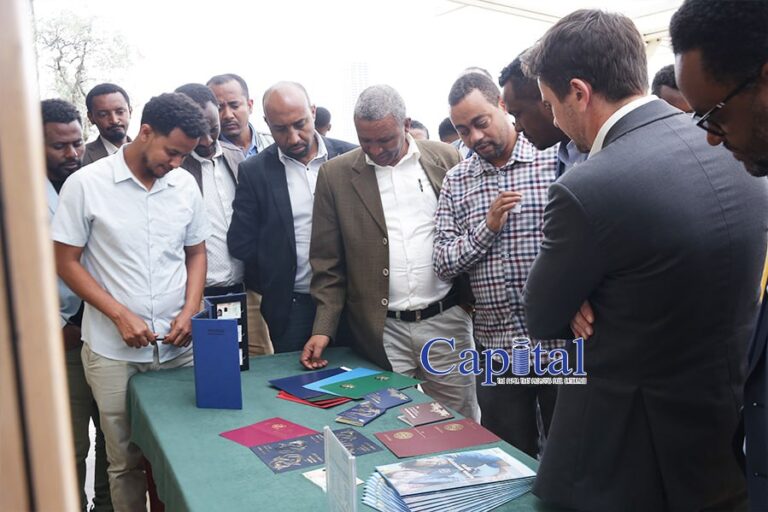Ethiopian Investment Holdings (EIH), a recently established sovereign wealth fund (SWF) that has teamed up with a dominant global security printing firm, is making its first greenfield investment. By 2026, the initiative aims to transform the security printing industry.
The facility called Toppan Gravity Ethiopia (TGE), established by Toppan Gravity, EIH, Berhanena Selam Printing Enterprise, and Education Materials Production and Distribution Enterprise, both of which are under EIH, will be equipped with cutting-edge technology and stringent security measures to produce high-quality passports, ID cards, and banking cards, setting new standards for security and integrity.

Kalkidan Arega, CEO of TGE, amplifies the strategic partnership between Toppan Gravity and Ethiopian companies as a collective commitment to revolutionize the security printing sector, not only within Ethiopia but across the African continent.
Ahmed Shide, Minister of Finance and Board Member of EIH, underscores the transformative potential of the security printing facility.
Abdurehman Eid Tahir, CEO of EIH, highlights the project as a successful Public-Private Partnership (PPP), demonstrating EIH’s commitment to collaborative ventures that address critical gaps in the economy. “The project’s contribution to knowledge transfer and skills development empowers future generations of Ethiopians,” he emphasized. Abdurehman acknowledges the project as EIH’s inaugural greenfield investment, symbolizing the SWF’s commitment to innovation and strategic growth.

Selamawit Dawit, Director General of Immigration and Citizenship Services, emphasizes the critical role passports play in national security and international relations. She highlights ongoing efforts to enhance services and underscores the significance of the groundbreaking ceremony and factory project in advancing Ethiopia’s capacity to produce passports domestically.
The facility, to be constructed as part of this venture, will specialize in manufacturing security printings. Equipped with advanced technology and stringent quality control measures, the facility is poised to exceed industry standards and cater to the evolving needs of the market, according to the statement of TGE.
The groundbreaking ceremony included the unveiling of the new Ethiopian E-Passport, showcasing its security features, cover page, and distinctive characteristics setting it apart from its predecessor.
With the launch of the manufacturing plant that will consume USD 55 million in Bole Lemi Industry Park, the Toppan Group plans to harness its technologies and solutions to establish capabilities for the provision of a full range of government ID solutions in the African market, with a view to producing IDs and passports for neighboring countries in the future. The government of Ethiopia, meanwhile, will ensure operational design aligned with local needs by establishing rules and regulations for passports and IDs.
Toppan Gravity is a subsidiary of Toppan Next, serving as the international development arm of the Toppan Group in the security domain. Being part of the most prestigious conglomerate in the industry with decades of experience and multiple well-known references, Toppan Gravity benefits from the Toppan Group’s strong market position and extensive expertise.
As a global solutions provider primarily focused on the payment and identity industries, Toppan Gravity aims to develop the next generation of virtual and physical security solutions.
The Toppan Group’s security business traces its roots back to the security printing that was core to its operations at the time of its founding in 1900. Backed by this extensive track record, the Toppan Group has provided government IDs for more than 40 countries.
Regarding the Ethiopian investment, the Toppan Group holds a 51 percent stake in the company via Toppan Gravity’s UAE-based subsidiary Gravity Group Ind. L.L.C and one other company, while the Ethiopian government holds a 49% stake through the national printing press and the two other enterprises.








